In this article:
Your mouth is naturally populated with different microorganisms, mostly bacteria, which exist in a state of perfect equilibrium and make up your oral microbiome. These bacteria help break down food during the chewing process (mastication) and release foul-smelling sulfur compounds as by-products.
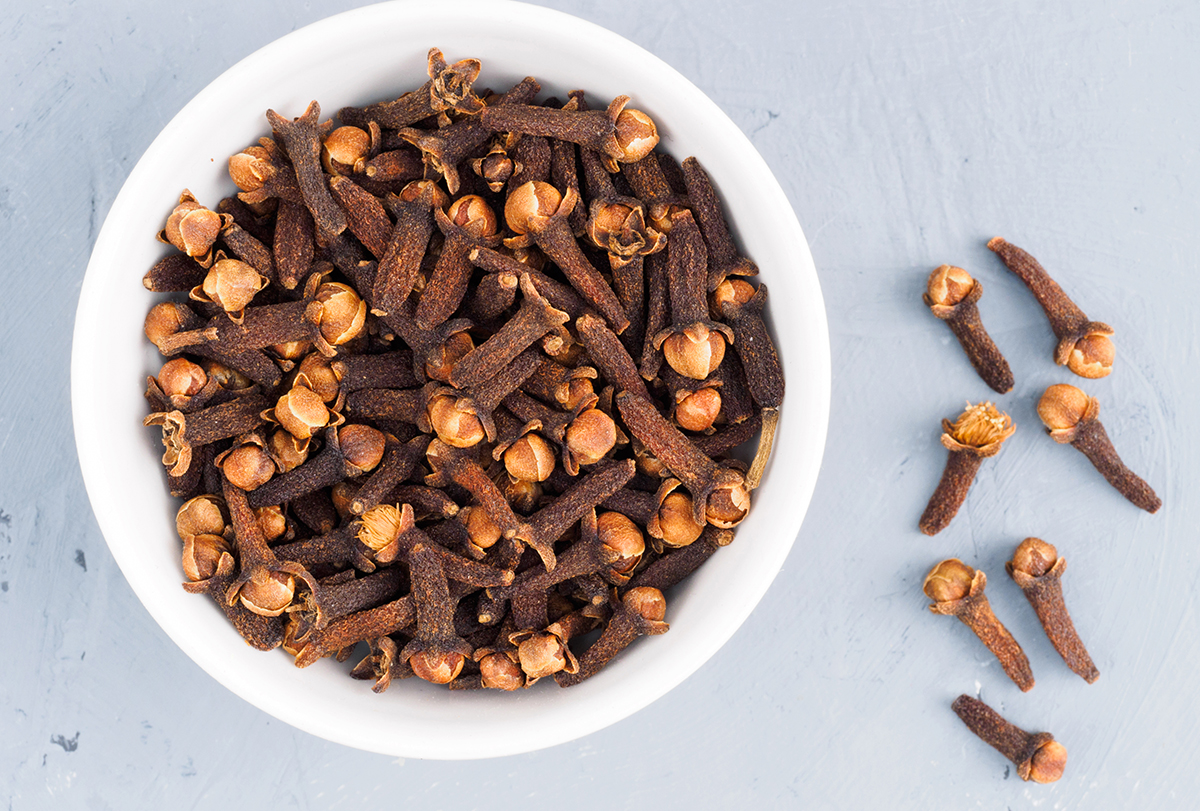
Certain factors can cause the overgrowth of such malodorous bacteria in the mouth, resulting in bad breath (halitosis). The most common contributors are negligent oral hygiene, dry mouth, smoking, specific foods, certain medications, and medical conditions such as diabetes, kidney ailments, and sinus infections. (1)
Home Remedies for Bad Breath
Here are some easy and natural ways to get rid of bad breath.
1. Maintain oral hygiene
The buildup of food residue in the mouth due to poor oral hygiene fosters the growth of malodorous bacteria that stink up your breath. So, the first thing you need to do to prevent or eliminate bad breath is to strictly follow a proper oral hygiene routine.
Here’s what you need to do:
- Brush your teeth twice daily, once in the morning and then again at night.
- Floss every day to remove the food debris stuck between teeth. (2)
- Change your toothbrush after every 2–3 months.
- Gently scrub the tongue with a metallic scraper to remove any food particles stuck on it that can later invite bacterial overgrowth and cause bad breath.
2. Bite into a clove
Clove is rich in an aromatic oil called eugenol, which exhibits potent antibacterial activity. (3) When you bite or chew this spice, it releases eugenol, which kills the foul-smelling oral bacteria and reduces bad breath.
Eugenol is quite strong, so it might cause slight burning or tingling in the mouth. The best way to minimize this is to move the clove all over the tongue and around the oral cavity to spread out the oil. This will also help cover all your oral surfaces with the oil to maximize the deodorizing effect.
You can also prepare clove tea and use it as a mouthwash to freshen up your breath.
Note: Don’t use clove oil or powdered cloves as they contain concentrated amounts of eugenol, which can burn your mouth.
Method 1
- Chew 1–2 pieces of whole cloves, and roll them all around the mouth while doing so.
- Spit out the cloves once you are done.
Method 2
- Put a teaspoon of ground cloves in boiling water.
- Simmer for about 5 minutes, and then turn off the heat.
- Strain the tea into a cup or container, and let it cool down.
- Use this liquid to rinse your mouth.
3. Eat a piece of orange peel
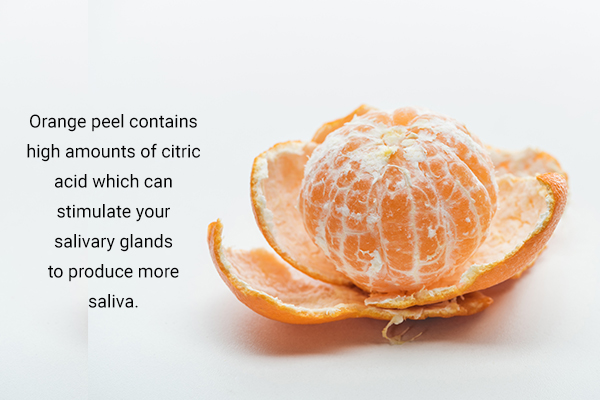
Orange peel contains high amounts of citric acid, which can stimulate your salivary glands to produce more saliva. (4) The increased salivary flow helps flush down the food particles and bacteria in your mouth, thus decreasing bad breath.
Simply chew on orange rinds whenever you can to make your mouth smell clean and fresh. You can also consume orange juice.
4. Consume probiotics
Yogurt is one of the best sources of probiotics or healthy bacteria such as lactobacillus that can help counter the malodorous bacteria in the mouth.
One study demonstrated that continued intake of yogurt for 6 weeks reduced foul breath in 80% of the study participants.
Just add a single serving of plain, nonfat yogurt to your daily diet and see the difference. (5)
5. Use a cinnamon rinse
Cinnamon is credited with significant antimicrobial properties that can help curb bacterial overgrowth inside the mouth and thus deter oral infections as well as bad breath. (6)
How to use:
- Add 1 teaspoon of cinnamon powder to a cup of boiling water.
- Put in some bay leaves and cardamom for added benefits, but these are optional.
- Strain the liquid, and use it as a mouth rinse to banish bad breath.
6. Drink green tea
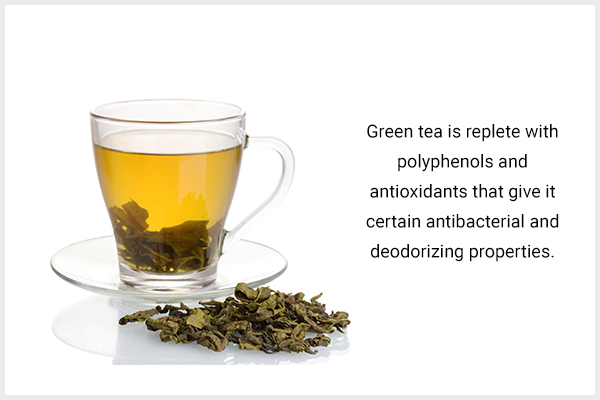
Green tea is replete with polyphenols and antioxidants that give it certain antibacterial and deodorizing properties. Thus, it may prove useful in fighting the foul-smelling bacteria in the mouth to mitigate bad breath. (7)
Consume 3–5 cups of green tea daily.
7. Chew fennel seeds
Fennel seeds exhibit antiseptic effects that help destroy the malodorous bacteria in the mouth and thereby neutralize foul breath. (8)
Plus, they increase the production of saliva, which helps clear the bacteria and food residue from the mouth and makes it less likely to smell bad.
Chew a spoonful of fennel seeds to fight bad breath.
8. Chew parsley
Parsley contains a natural detoxifying agent called chlorophyll, which can help clear bacteria from the mouth and reduce bad breath within a matter of minutes. (9)
It works as a great mouth freshener that you can carry with you when eating out with others to avoid the embarrassment of bad breath after a meal.
Simply chew a sprig of parsley once you are done with your meal to instantly refresh your breath.
9. Rinse with baking soda
Baking soda is alkaline and therefore can help neutralize the acids in your mouth and minimize bad breath. (10)(11)
How to use:
- Add 1 teaspoon of baking soda to a glass of warm water and mix it well.
- Rinse your mouth with the mixture without swallowing.
- Repeat until your whole mouth feels clean and fresh.
10. Try tea tree oil
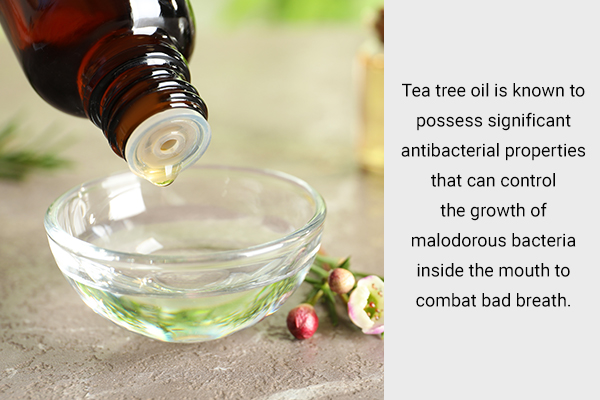
Tea tree oil possesses significant antibacterial properties that can control the growth of malodorous bacteria inside the mouth and thus combat bad breath.
How to use:
- Put a few drops of tea tree oil on top of your toothpaste and brush your teeth with it.
- You can also apply the tea tree oil directly to the toothbrush, and scrub your teeth with it, but this does not mean that you should skip brushing with toothpaste.
- Mix a few drops of tea tree oil in warm water, and use this solution as a mouthwash.
11. Use lemon juice
The acidic nature of lemon juice can help trigger saliva production and reduce bacterial overgrowth inside the mouth, thus preventing bad breath.
Moreover, the strong citrusy smell of lemon can help camouflage foul breath and add freshness to your mouth. (12)
How to use:
- Mix 1 tablespoon of lemon juice and some salt (optional) in a cup of water.
- Rinse your mouth with this solution regularly.
12. Rinse with apple cider vinegar
Apple cider vinegar is richly endowed with good bacteria that help fight the foul-smelling bacteria in your mouth and thus eliminate bad breath.
Additionally, it has an alkaline pH, which brings down the acidity inside the mouth, curbing the growth of bacteria. (13)(14)
Don’t drink it straight out of the container, though! Apple cider vinegar is too concentrated for large direct consumption.
How to use:
- Mix some apple cider vinegar in a cup of water.
- Squish this solution inside your mouth and gargle with it to reduce foul breath.
Preventive Measures Against Bad Breath
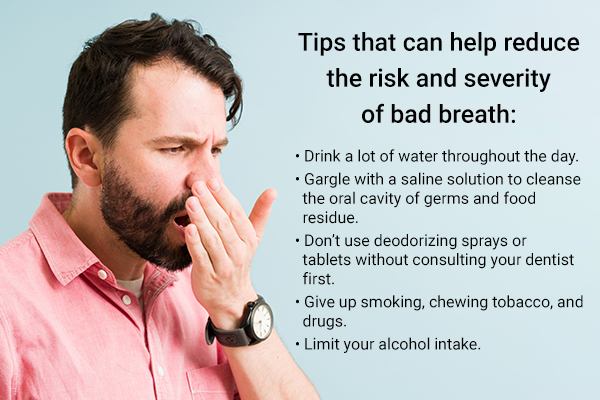
Here are a few tips that can help reduce the risk and severity of bad breath:
- Drink a lot of water throughout the day.
- Gargle with a saline solution to cleanse the oral cavity of germs and food residue.
- Consult your doctor about colon cleansing.
- Consume a wholesome, nutritious diet, and maintain a fixed eating schedule. Poor food choices and erratic eating habits can trigger excessive gas buildup, which can also make your breath smell bad.
- Remove your dentures at night before going to sleep, and clean them thoroughly before wearing them again.
- Don’t use deodorizing sprays or tablets without consulting your dentist first.
- Give up smoking, chewing tobacco, and drugs.
- Limit your alcohol intake.
- Go for regular dental checkups. The dentist will closely monitor your oral health and catch problems such as bad breath, gum disease, oral infections, and dry mouth in the early stages, allowing the initiation of timely treatment. If the dentist is unable to diagnose the root cause of your halitosis, you may be sent to your primary doctor for a more thorough examination.
How Will the Doctor Determine the Causes of Bad Breath?
Doctors generally diagnose the root cause of foul breath using the following steps:
- Checking the patient’s vital signs, mainly their body temperature to see if they have a fever or not.
- Examining the nasal cavity for the presence of discharge or any foreign body and signs of dryness.
- Examining the mouth for symptoms of gum disease, tooth infection, and cancer as well as apparent signs of dryness.
- Examining the pharynx for signs of infection and cancer.
- Conducting a sniff test, in which the patient is made to sit 10 cm away from the examiner and then exhale, first with his mouth open and then closed. If the air released from the mouth smells worse than the one released through the nose, an oral cause is suspected. If the air released from the nose is worse than that from the mouth, a nasal or sinus etiology is considered. If the same smell comes from both the nose and mouth, the problem may be systemic or pulmonary. (15)
Final Word
Bad breath is quite embarrassing and can make you self-conscious while interacting with others. It can stem from many different causes but is generally the result of poor oral hygiene.
So, the first thing you need to do is to keep your mouth clean. You can follow the above-listed tips and remedies to treat halitosis at home.
However, if the condition persists even after a few weeks of trying these interventions, consult your dentist for a more thorough checkup and proper diagnosis. The doctor will identify the root cause of the problem and then suggest the appropriate treatment.
- Was this article helpful?
- YES, THANKS!NOT REALLY


